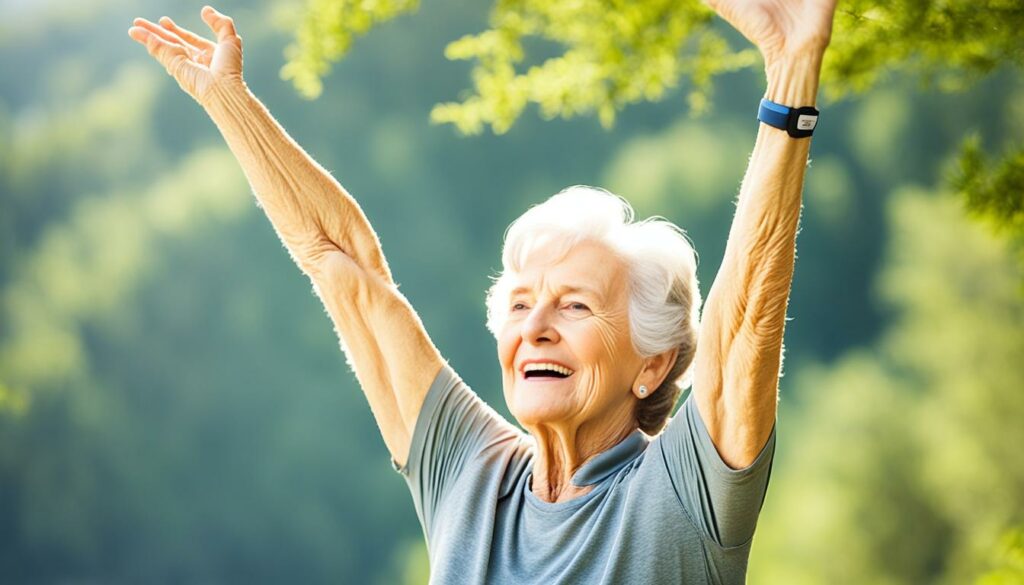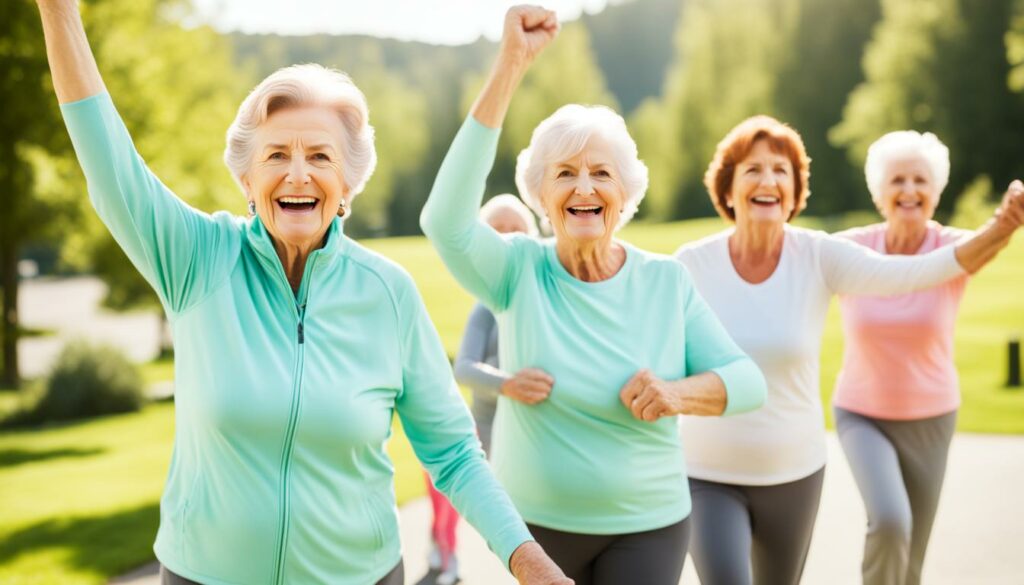Welcome to our guide on health essentials for women over 60! As women age, prioritizing their health becomes increasingly important. By focusing on proper nutrition, staying active, and seeking regular healthcare, women can embrace a vibrant future and age gracefully. In this section, we will explore key tips and insights that will help senior women prioritize their well-being and enjoy a fulfilling life.
As we age, our bodies undergo certain changes, and it’s crucial to adapt our lifestyles accordingly. By making informed choices and adopting healthy habits, women over 60 can optimize their overall well-being and maintain a high quality of life. Let’s delve into the essential aspects that contribute to a healthy and vibrant future.
Key Takeaways:
- Proper nutrition plays a vital role in maintaining good health for women over 60.
- Engaging in regular physical activity is essential for overall well-being and fitness.
- Regular health check-ups and preventative care are crucial in detecting and preventing potential health issues.
- By adopting a healthy lifestyle, women over 60 can embrace the aging process gracefully.
- Wellness for older women is all about making conscious choices and prioritizing self-care.
Senior Women’s Nutrition: Key Considerations for a Healthy Diet
One of the most important aspects of maintaining good health for women over 60 is nutrition. As the body ages, it undergoes various changes that require a different approach to eating. In this section, we will discuss key considerations for a healthy diet, including the importance of nutrient-rich foods, portion control, and hydration.
The Importance of Nutrient-Rich Foods
As women age, their bodies require a higher intake of certain nutrients to support overall health and wellness. It is crucial for senior women to prioritize nutrient-rich foods in their diet. These include:
- Fruits and vegetables: Packed with essential vitamins, minerals, and fiber, fruits and vegetables should form the foundation of a senior woman’s diet. Aim for a colorful variety to obtain a wide range of nutrients.
- Whole grains: Opt for whole grains such as brown rice, quinoa, and whole wheat bread, which provide more fiber and nutrients compared to refined grains.
- Lean protein: Include lean sources of protein like fish, poultry, beans, and legumes in your meals. Protein is essential for maintaining muscle mass and supporting overall health.
- Healthy fats: Incorporate healthy fats from sources like avocados, nuts, seeds, and olive oil. These fats are beneficial for heart health and brain function.
- Dairy or calcium-rich alternatives: Ensure an adequate intake of calcium through dairy products or alternatives like fortified plant-based milk.
Portion Control
Portion control becomes increasingly important as we age, as our metabolism slows down, and our bodies require fewer calories. It’s essential for senior women to listen to their bodies and eat until satisfied, rather than overeating. Consider using smaller plates, bowls, and utensils to help control portions. Pay attention to hunger and fullness cues and aim for balanced meals that include a combination of protein, carbohydrates, and healthy fats.
Hydration for Healthy Aging
Proper hydration is vital for maintaining overall health in senior women. Dehydration can lead to various health issues, such as reduced cognitive function, constipation, and urinary tract infections. Aim to drink at least 8 cups (64 ounces) of water per day, adjusting for individual needs and activity levels. If plain water is unappealing, try infusing it with fruits or herbs to add flavor.
“Nutrition is the foundation of good health, especially for women over 60. By focusing on nutrient-rich foods, practicing portion control, and staying adequately hydrated, senior women can support their well-being and enjoy a vibrant life.”
By incorporating these key considerations into their diet, senior women can take proactive steps towards optimizing their nutrition for healthy aging. It’s important to consult with a healthcare professional or nutritionist for personalized guidance and recommendations that align with individual health needs and goals.
| Nutrient | Recommended Daily Intake | Sources |
|---|---|---|
| Calcium | 1200 mg | Dairy products (milk, yogurt, cheese), fortified plant-based milk, leafy green vegetables |
| Vitamin D | 800-1000 IU | Sunlight exposure, fatty fish (salmon, mackerel), fortified dairy or plant-based milk, eggs |
| Omega-3 fatty acids | 1000-2000 mg | Fatty fish (salmon, tuna), flaxseeds, chia seeds, walnuts |
| Fiber | 25 grams | Whole grains, fruits, vegetables, legumes, nuts, seeds |
| Antioxidants | Variety of fruits and vegetables | Berries, citrus fruits, leafy greens, bell peppers, tomatoes |
Fitness for Elderly Women: Exercise and Its Benefits
Regular exercise is essential for maintaining good health and well-being in elderly women. Engaging in physical activity not only helps to improve cardiovascular health and maintain a healthy weight but also provides a range of other benefits that contribute to aging gracefully.
The Benefits of Exercise for Women’s Health After 60
Exercise offers numerous advantages for elderly women, including:
- Improved muscle strength and flexibility
- Enhanced bone health and reduced risk of osteoporosis
- Boosted immune system and reduced risk of chronic diseases
- Increased energy levels and improved mood
- Enhanced cognitive function and reduced risk of cognitive decline
“Exercise is the key to staying vibrant and active as we age. It not only benefits our physical health but also improves our mental and emotional well-being.” – Dr. Sarah Johnson, Senior Health Expert
Types of Exercise Suitable for Elderly Women
Elderly women can benefit from a combination of aerobic exercise, strength training, and flexibility exercises. Good options for exercise include:
- Brisk walking or jogging
- Swimming or water aerobics
- Cycling or using a stationary bike
- Low-impact aerobics or dance classes
- Yoga or Pilates for flexibility and balance
- Strength training with resistance bands or light weights
Tips for Incorporating Exercise into Daily Routines
Here are some tips to help elderly women incorporate physical activity into their daily routines:
- Schedule exercise sessions on a regular basis and make them a priority
- Start slowly and gradually increase the intensity and duration of workouts
- Find activities that you enjoy and make exercising fun
- Consider joining fitness classes or groups for social interaction
- Listen to your body and modify exercises to fit your abilities
Remember, it’s important to consult with a healthcare professional before starting any new exercise regimen, especially if you have any underlying health conditions or concerns.

| Exercise Type | Benefits |
|---|---|
| Aerobic Exercise | Improves cardiovascular health and stamina |
| Strength Training | Increases muscle mass, strength, and bone density |
| Flexibility Exercises | Enhances joint flexibility and improves balance |
Health Care for Women Over 60: Regular Check-ups and Preventative Measures
Regular check-ups and preventative care are essential for maintaining good health as women age. As women enter their senior years, prioritizing regular health screenings and taking proactive measures can greatly contribute to their overall well-being and quality of life.
Health Care for Women Over 60
Regular health screenings are crucial for early detection and prevention of potential health issues. These screenings may include:
- Annual physical examinations
- Mammograms for breast cancer screening
- Colonoscopies for colorectal cancer screening
- Bone density tests for osteoporosis
- Regular blood pressure checks
- Cholesterol level monitoring
By regularly monitoring their health, women over 60 can catch any potential problems early on, allowing for better treatment options and outcomes.
Vaccinations for Senior Women
Vaccinations are an important part of preventive care and can help protect senior women from various diseases and infections. Some vaccines recommended for women over 60 include:
- Annual influenza (flu) vaccine
- Pneumococcal vaccine for pneumonia
- Shingles vaccine
- Tetanus, diphtheria, and pertussis (Tdap) vaccine
It is important to consult with a healthcare provider to determine which vaccinations are recommended based on individual health conditions and medical history.
Preventative Measures for Aging Women
In addition to screenings and vaccinations, there are several proactive measures women over 60 can take to prevent common health conditions and maintain their well-being:
- Eat a balanced diet rich in fruits, vegetables, whole grains, and lean proteins.
- Stay physically active through regular exercise, such as walking, swimming, or yoga.
- Maintain a healthy weight to reduce the risk of chronic diseases.
- Avoid tobacco and limit alcohol consumption.
- Manage stress through relaxation techniques, hobbies, and social connections.
- Get enough sleep to support overall health and vitality.
By incorporating these preventative measures into their lifestyle, women over 60 can significantly improve their health and well-being.
Conclusion
Regular check-ups and preventative care are essential components of health care for women over 60. By staying proactive in their health management, women can enjoy a higher quality of life, reduced healthcare costs, and increased overall well-being in their senior years.

Conclusion
In conclusion, women over 60 can embrace a vibrant future by prioritizing their health and adopting a healthy lifestyle. By following these essential health tips, senior women can age gracefully and enjoy a fulfilling life.
Proper nutrition is key to maintaining good health. Senior women should focus on consuming nutrient-rich foods and practicing portion control. Hydration is also important to support overall well-being.
Regular exercise plays a crucial role in promoting physical and mental well-being. Elderly women should choose activities suitable for their abilities and incorporate physical activity into their daily routines.
Seeking regular healthcare is vital for women over 60. Scheduling regular check-ups, screenings, and vaccinations, along with taking proactive preventative measures, can help maintain optimal health in senior women.
By following these health tips and taking care of themselves, women will achieve healthy aging and enjoy their golden years with vitality and wellness.
FAQ
What are some important health tips for women over 60?
Some important health tips for women over 60 include maintaining a balanced diet, staying physically active, getting regular check-ups, managing stress, and prioritizing self-care.
How can nutrition help senior women stay healthy?
Nutrition plays a vital role in senior women’s health. It is important to consume a variety of nutrient-rich foods, including fruits, vegetables, whole grains, lean proteins, and healthy fats. Additionally, staying hydrated and controlling portion sizes are key considerations for a healthy diet.
What are the benefits of exercise for elderly women?
Regular exercise offers numerous benefits for elderly women, including improving cardiovascular health, maintaining muscle mass and bone density, reducing the risk of chronic diseases, enhancing mood and mental well-being, and promoting better sleep.
How can elderly women incorporate exercise into their daily routines?
Elderly women can incorporate exercise into their daily routines by engaging in activities such as walking, swimming, cycling, yoga, tai chi, and strength training exercises. It is essential to choose activities that are enjoyable, safe, and suitable for individual fitness levels.
What preventative measures should women over 60 take for their health?
Women over 60 should prioritize regular health screenings, including mammograms, bone density tests, and screenings for diabetes, high blood pressure, cholesterol levels, and colorectal cancer. Additionally, staying up to date with vaccinations and adopting healthy lifestyle habits, such as not smoking and maintaining a healthy weight, can help prevent common health conditions.







